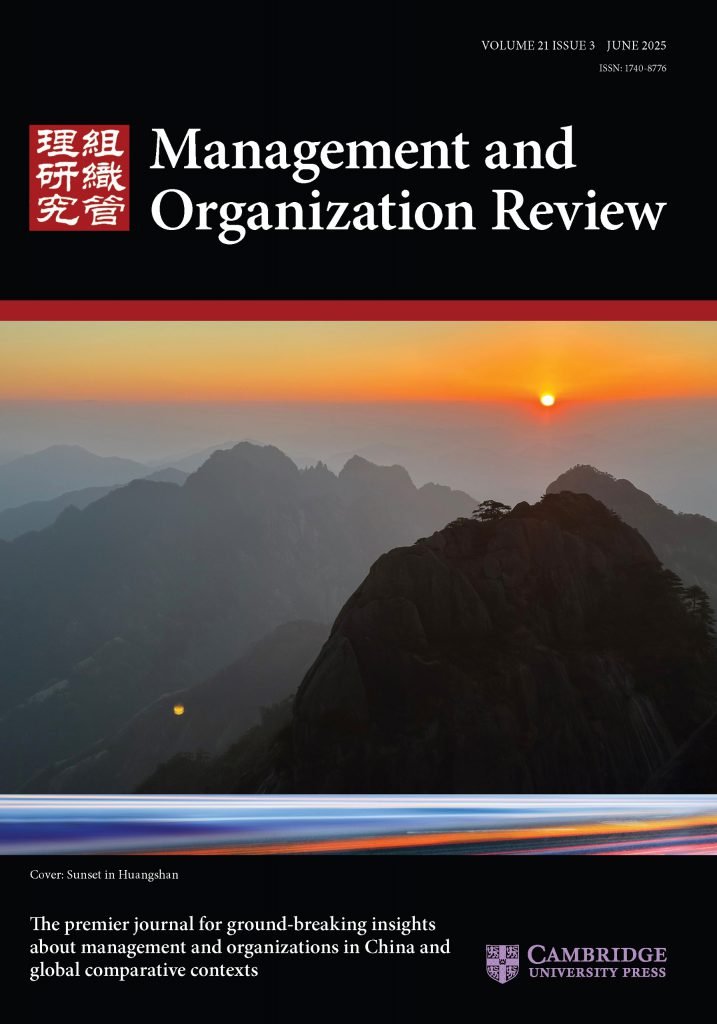主编来信|《组织管理研究》21.3

Letter from the Editor
Four years ago, when I took the reign of MOR, the new editorial team had many discussions about what the mission of MOR should be in an era characterized by rapid technological advancement and ever shifting geopolitical landscape. To my surprise, although the discussion was long and deep, we reached consensus rather quickly. MOR’s mission is to provide ground- breaking insights about the organization and management in Chinese context and global comparable contexts. For that purpose, we have encouraged scholars to conduct phenomenon-based indigenous Chinese management research, and published call for papers on fifteen Special Issues that study novel organizational phenomena in Chinese organizations. (for details, see https://www.cambridge.org/core/journals/management-and-organization-review/announcements/call-for-papers )
To further facilitate management scholars to engage in phenomenon-based indigenous Chinese management research, our editorial team decided to write an Editorial Series to systematically illustrate what such research is, why we should do such research, how we can do it, what kind of difficulties and pitfalls might be related to such research, and the potential strategies and tactics to tackle them. We plan to publish 10+ short editorials in the next few issues.
This issue publishes the first editorial essay by me (Chen, 2025). I adopt an evolution of theories perspective to argue that developing a new theory to explain new management phenomenon in the Chinese context serves as the first step to advance the new theory to become a universal theory later on, because majority of the management theories that we consider as universal today started from a theoretical account for a specific new phenomenon a scholar observed in a particular time and space. It’s only after being tested across time and space that the theory evolved to become universal.
This issue also publishes an insightful perspective paper by Wang, Lounsbury, Chen, and Ren (2025), who elaborate on the distinct configuration of institutional logics in China, where state logic is more dominant and often directs other logics, thus shaping organizational behavior differently than its Western counterpart. They then propose the need for a broader research agenda on the dynamics of institutional logics in the Chinese context.
The regular research papers published in this issue explore several topics. One focuses on the CEO and top executives. For example, Du, Tong, Wu and Wang (2025) examine how CEO’s early-life poverty trauma exposure affects firm’s involvement in poverty alleviation and the prioritization between generic and strategic involvement, whereas Lu, You, and Jia (2025) investigate how CEO humility influences organizational virtuousness and, hence, firm reputation, in the eyes of the government in China when the firm is intensively connected to government intermediaries. Zhong, Ren, and Wu (2025), meanwhile, study whether and when returnee executives influence nonmarket strategic actions, especially enterprise bribery. The other topics include political connections and firm environmental responsible and irresponsible behaviors (Li, Miao, Wong, & Liang, 2025), firm strategy oriented toward growth versus profit (Zhou, Kang, & Park, 2025), and subsidiaries of multi-national enterprises regarding their distributive justice, internal embeddedness, and initiatives (Weng & Chen, 2025).
Finally, in the Dialogue, Debate, and Discussion section, scholars are continuing offering their commentaries on the Zhang and Chen’s (2024) perspective paper, which suggested that management scholars might learn from the field of medicine to be open minded about publishing different kinds of scholarly papers. I thank Marshall Meyer and Eric Tsang for their thoughtful writing and Zhang and Chen’ responses and deep reflections.
Xiao-Ping Chen
Editor-in-Chief

Editorial Essay
Xiao-Ping Chen
Why Do We Need Phenomenon-based Indigenous Chinese Management Research? An Evolution of Theories Perspective
Perspectives
Milo Shaoqing Wang, Michael Lounsbury, Xiaoyang Chen, and Yufei Ren
Change, Governance, and Diffusion of Institutional Logics in and Beyond Chinese Contexts
Regular Articles
Yongzhi Du, Li Tong, Wenxin Wu, and Chenjing Wang
Transfusion or Hematopoiesis? CEOs’ Early-Life Poverty Trauma and Asymmetric Involvement in Poverty Alleviation
Fangmei Lu, Shuyang You, and Liangding Jia (30pp)
CEO Humility and Firm Reputation in China: The Mediating Role of Organizational Virtuousness and Government Intermediary Connection as a Boundary Condition
Xi Zhong, Ge Ren, and Xiaojie Wu (26pp)
Returnee Executives, Institutional Environment, and Enterprise Bribery
Yuxuan Li, Xin Miao, Christina W. Y. Wong, and Zhou Liang (24pp)
Environmentally Responsible or Irresponsible: Political Connections and Organizational Visibility
Nan Zhou, Jingoo Kang, and Seung Ho Park (24pp)
Strategy for Sustained Profitable Growth: The Difference Between Growth- and Profit-Oriented Firms
David. H. Weng and Hsiang-Ling Chen (24pp)
Subsidiary Distributive Justice, Internal Embeddedness, and Subsidiary Initiative
Dialogue, Debate, and Discussion
Marshall W. Meyer (3pp)
Comment on Zhang and Chen, ‘Responsible Research: Reflections of Two Business Scholars Doing Mental Health Research During COVID-19’
Eric W. K. Tsang (3pp)
Explanation versus Prediction in Management Research: A Comment on Zhang and Chen
Stephen Xu Zhang and Jiyao Chen
Notes on Lessons from Health Sciences for Responsible Management Research
